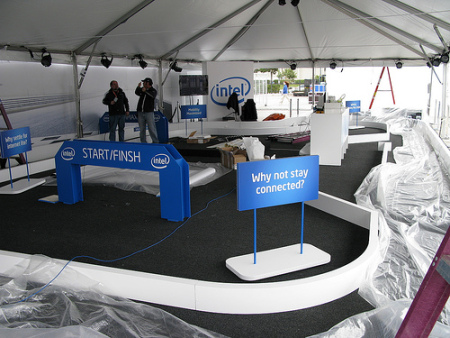WiMax is off to the races, analysts say
Jan 11, 2008 — by LinuxDevices Staff — from the LinuxDevices Archive — views The WiMax “user terminal” chipset market will grow from $27 million in 2007 to nearly $500 million in 2012, according to recent market research by In-Stat. Mobile PCs will be the primary driver, but dual-mode cellular/WiMax handsets and other equipment will also drive sales, In-Stat says.
The WiMax “user terminal” chipset market will grow from $27 million in 2007 to nearly $500 million in 2012, according to recent market research by In-Stat. Mobile PCs will be the primary driver, but dual-mode cellular/WiMax handsets and other equipment will also drive sales, In-Stat says.
Gemma Tedesco, In-Stat analyst, says “WiMax base station semiconductor revenues are expected to be approximately $1.4 billion in 2012, compared to $130 million in 2007.” In-Stat's report on the WiMax chipset market examined present and projected sales by type of product, including customer premise equipment (CPE), external clients, mobile PCs, cellular handsets, WiMax-only handsets, ultra-mobile devices (UMDs), handheld game consoles, and portable media players (PMPs).
Key findings included the following, according to In-Stat:
- Intel's combination Mobile WiMax and Wi-Fi module, Echo Peak, which will launch as an option to the company's Montevina mobile processor platform release in 2008, is expected to drive the adoption of embedded WiMax into mobile PCs. (Note: Intel's Baxter Peak — a slightly different module that is optimized for small form factors and low power consumption — is scheduled to appear in Nokia's N-series tablets later this year.)
- A multitude of chipset companies completely focused on the mobile WiMax market are expected to commercially release products in 2008, including Altair, Amicus, ApaceWave, Comsys, NextWave, Redpine Signals, and XROnet.
- WiMax radio frequency IC (RFIC) chip vendors — Maxim, PMC-Sierra, NXP, and Analog Devices — experienced solid wins over the course of 2007.
- During 2007, Sequans, Intel, Beceem, Runcom, and GCT Semiconductor were major players in the user terminal chipset space in 2007.
- The WiMax base station semiconductor market is dominated by picoChip, TI, Freescale, Sequans, and Runcom
WiMax technology.
WiMax is an implementation of the IEEE 802.16 standard for wireless broadband. Driven by Intel, Samsung, and Sprint — among other companies — it is promulgated by the 400+ member WiMAX Forum.

Intel constructed this track at CES 2008 so attendees could use WiMax to control toy racers
WiMax is said to provide fixed or mobile wireless broadband connectivity without the need for direct line-of-sight with a base station. According to a statement by the WiMax Forum, with a typical cell radius deployment of two to six miles, WiMAX can deliver capacity of up to 40 Mbps. At lower data rates, it can operate over distances as long as 30 miles.
Meanwhile, Sprint's WiMax-focused Xohm division is said to have begun a “soft launch” of WiMax with its employees in Chicago, Baltimore and Washington. Commercial WiMax service may begin in some U.S. cities as early as April, according to Xohm.
Further, makers of ultra mobile PCs (UMPCs), such as OQO with its model 02 and Asus with its EEE PC, have already demonstrated or discussed portable devices with integrated WiMax. At this week's Consumer Electronics Show, a “Mobile Internet & WiMax TechZone” showcased these and other products.
WiMax stalwart Intel placed two BMW F1 simulator cars at its booth so that visitors could use them to drive remote control race cars around a race track (pictured under construction, above) located across the street from the convention center. Control signals for the cars were carried over a WiMax network, which also sent back video so drivers could see where their cars were going, according to Intel. However, the company provided no information on how many crashes took place.
Further information
In-Stat's 26-page report, “WiMaX Chipset Market: Faith in Mobile WiMAX Drives Expected Volume Growth Worldwide,” costs $3,495. More information and a table of contents is available on the company's website, here.
This article was originally published on LinuxDevices.com and has been donated to the open source community by QuinStreet Inc. Please visit LinuxToday.com for up-to-date news and articles about Linux and open source.